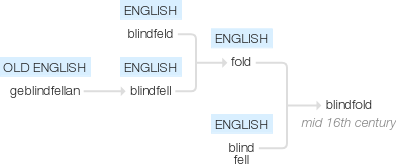Blindfold
mid 16th century: alteration, by association with fold1, of blindfeld, past participle of obsolete blindfell ‘strike blind, blindfold’, from Old English geblindfellan (see blind, fell2).
wiktionary
From Middle English blyndefolde, blyndfuld, blynfold, blindfeld, blindfelt, yblynfeld, variants of y-blyndfalled, blyndfelled, etc. ("stricken blind, blindfolded"), past participle of Middle English blindfellen(“to strike blind”), from blind(“to blind”) and fellen(“to fell”), equivalent to blind + felled.
etymonline
blindfold (v.)
"to cover the eyes to hinder from seeing," a mistaken formation ultimately from Old English (ge)blindfellian "to strike blind," from blind (adj.) + Anglian gefeollan "to strike down, make fall, cause to fall" (see fell (v.1)).
This became Middle English blindfellen "to strike blind," also "to cover (the eyes) to block vision" (c. 1200). This was most common in the past-participle, blindfelled, blindfeld," whence the -d was, in the 15th c., erroneously admitted to the stem of the vb." [OED]. It was further altered early 16c. by similarity to fold, from the notion of "folding" a band of cloth over the eyes. Related: Blindfolded; blindfolding.
blindfold (n.)
1880, "something wrapped around the head over the eyes to take away vision," from blindfold (v.). Earlier in this sense was blindfolder (1640s).
